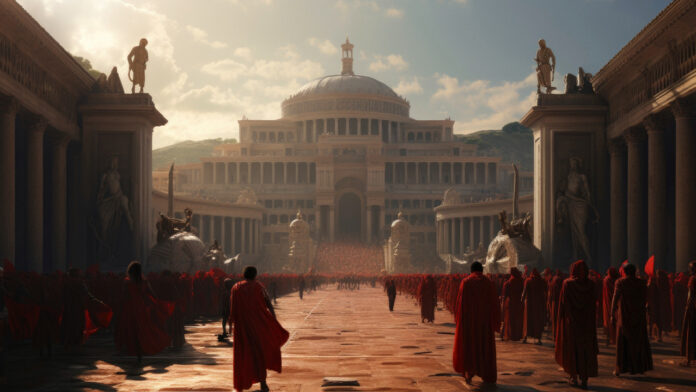The Roman Empire, a beacon of civilization that spanned centuries, continues to captivate our imaginations with its grandeur, innovation, and historical significance. In this immersive journey, we delve into the heart of ancient Rome to uncover the most intriguing facts about the Roman Empire, shedding light on the era that shaped the course of Western civilization.
Founding Legends and Early Rome
- Romulus and Remus: The legendary tale of twin brothers Romulus and Remus, raised by a she-wolf, is at the heart of Rome’s founding mythology. Romulus went on to become the first king of Rome, establishing the city on the Palatine Hill.
- Seven Hills of Rome: Rome is famously known as the “City of Seven Hills,” with each hill playing a strategic role in the city’s development. The Capitoline, Palatine, and Aventine Hills are among the prominent ones.
Rise of the Roman Republic
- The Roman Republic: The Roman Republic emerged around 509 BCE, marking the shift from monarchy to a system of elected officials. Rome’s political structure evolved, with a Senate and consuls governing the state.
- Punic Wars and the Conquest of Carthage: The three Punic Wars between Rome and Carthage defined the Republic’s expansion. The victory in the Third Punic War led to the destruction of Carthage, establishing Rome as a dominant Mediterranean power.
Julius Caesar and the Transition to Empire
- Julius Caesar’s Triumphs: Julius Caesar, a military genius and statesman, played a pivotal role in Roman history. His conquest of Gaul and crossing of the Rubicon River marked a turning point, leading to his appointment as dictator.
- Ides of March and Caesar’s Assassination: The assassination of Julius Caesar on the Ides of March (March 15, 44 BCE) by a group of senators, including Brutus and Cassius, precipitated a series of events that would shape the transition from Republic to Empire.
The Glorious Roman Empire
- Octavian and the Augustan Age: Following the demise of Caesar, his adopted son Octavian (later known as Augustus) emerged victorious in the power struggle. The Pax Romana (Roman Peace) characterized Augustus’s reign, marking an era of stability and prosperity.
- Roman Architecture Marvels: The Roman Empire boasts iconic architectural achievements, including the Colosseum, the Roman Forum, and the Pantheon. These structures showcase the Romans’ engineering prowess and artistic sensibilities.
Roman Culture and Innovations

- Gladiatorial Games: Gladiatorial contests held in arenas like the Colosseum were a defining aspect of Roman entertainment. Gladiators, often slaves or prisoners, fought for their lives in front of cheering crowds.
- Roman Engineering: Romans were master engineers, creating aqueducts, roads, and bridges that stood the test of time. The Roman road network, known as the “Viae Romanae,” facilitated efficient communication and trade.
Decline and Fall of the Roman Empire
- Crisis of the Third Century: The Roman Empire faced internal strife and external threats during the Crisis of the Third Century (235–284 CE). Economic troubles, military conflicts, and political instability marked this tumultuous period.
- Division of the Empire: Diocletian, in response to the challenges, divided the Roman Empire into the Eastern and Western Roman Empires. The Eastern Roman Empire, later known as the Byzantine Empire, outlasted its western counterpart.
Lasting Legacy and Influence
- Latin Language and Roman Law: Latin, the language of ancient Rome, evolved into the Romance languages and continues to influence modern legal terminology. Roman law laid the foundation for legal systems in many Western countries.
- Roman Numeral System: The Roman numeral system, used for centuries, is still prevalent in various contexts, from clock faces to the numbering of book chapters.
Enduring Fascination and Pop Culture Impact
- Gladiator Films: The allure of gladiatorial combat endures in popular culture, with films like “Gladiator” (2000) capturing the drama and spectacle of ancient Roman arenas.
- Literary Classics: Works like “Julius Caesar” by William Shakespeare and “The Aeneid” by Virgil continue to be celebrated literary classics that draw inspiration from Roman history and mythology.
Conclusion: Legacy of Eternal Rome
In conclusion, the Roman Empire stands as a testament to the heights of human achievement, innovation, and cultural influence. From its mythical beginnings to the grandeur of the Augustan Age and the enduring legacy in language and law, the Roman Empire continues to echo through the annals of history. As we explore the fascinating facts about ancient Rome, we unveil a civilization that shaped the course of Western civilization and left an indelible mark on the world—a legacy that resonates even today.

